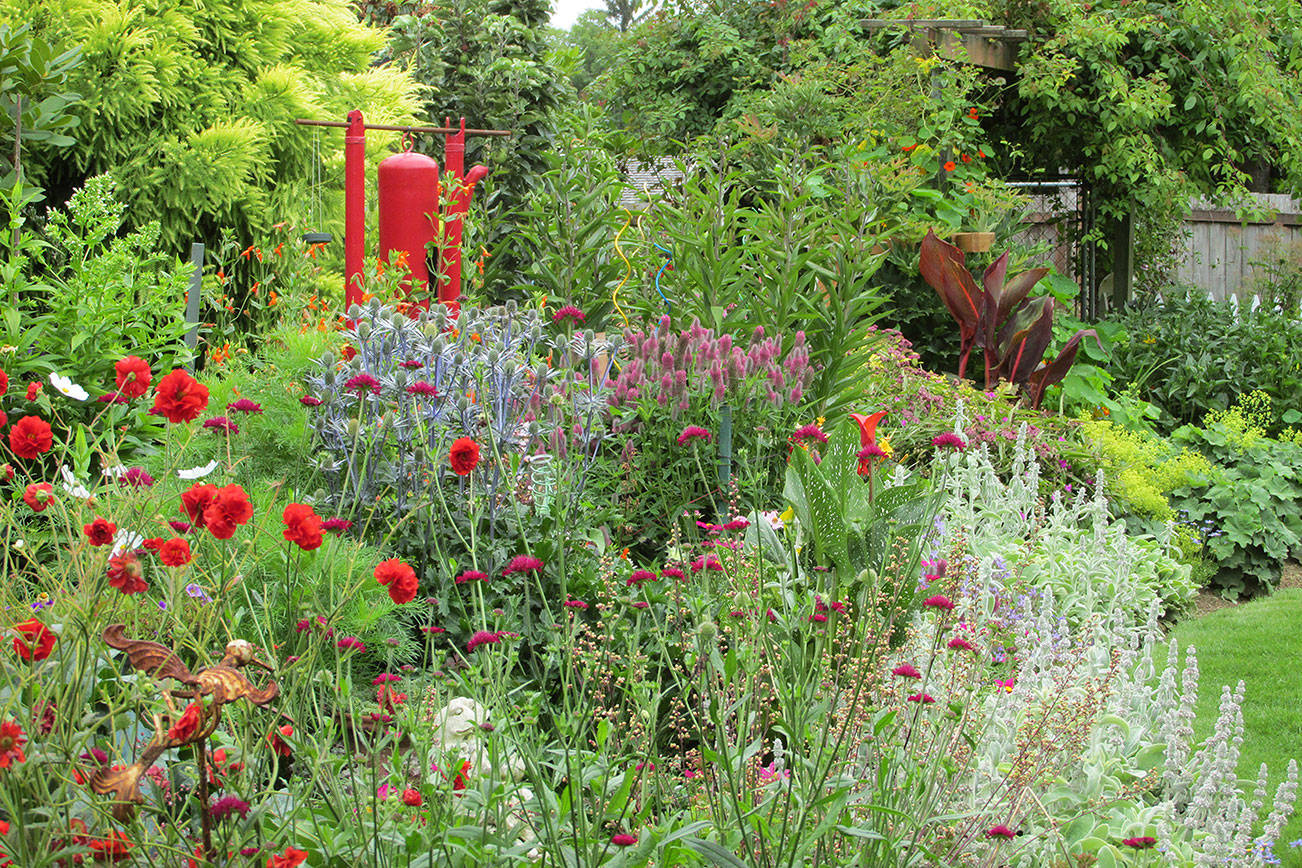By Jacqui Austin
WSU Master Gardener trainee
The little girl knelt beside her grandmother. She intently watched as the woman popped a small plant from the six-pack tray. The bright colors of the flowers fascinated the child.
“This is how we put a baby plant in the garden bed,” she explained. The seedling slipped into the hole and she sprinkled soil over the hair-like roots. “Now you can plant its friends. Then we’ll water them in.”
I sighed, “Someday, Grandma, I want to be just like you.” Now, I kneel with my granddaughter and repeat the process … That is why I became a Master Gardener.
I love to see the faces of children and adults as they learn about plants. I enjoy teaching them how to care for plants. I thrill when people see how they can improve their homes with plants. It’s wonderful to watch a person, young or old, taste a fruit or vegetable fresh from the garden.
Introducing other people to the wonders of plants is one of the things Master Gardeners do.
Are you wondering what the Master Gardeners Program involves?
Washington State University Extension created the very first Master Gardener program in the mid-1970s. The Extension saw this as a solution to assist the public without increasing the size of the agencies. The program now exists in all 50 states and eight Canadian provinces. Today over 95,000 active Master Gardeners provide more than 5,000,000 volunteer services hours per year to their communities!
State land grant colleges generally administer the volunteer programs. WSU continues to oversee the Washington program. “Trainees” complete the modular program of step-by-step chapters. The lessons have many learning styles, including reading, videos, fun exercises, puzzles, demonstrations, lectures, and hands-on experiences.
Wondering what the classes include?
Some trainees have little experience and others have more, so the program covers basic gardening information. This includes botany, soil, plant nutrition, insects, plant diseases, vegetables, fruits, pruning and propagation. Woven throughout the program are plant (and weed!) identification and how to use plants in the landscape. We often remind ourselves “Right plant, right place.”
County chapters focus on plants and pests found in their part of the state. Of course, native plants and plants to solve local problems receive much attention. We learn about methods of managing pests, including deer. And we learn to work with people who have plant questions. In case you’re worried about that … it’s always okay to say, “I don’t know the answer, but we can find out.” Thus, Master Gardeners learn together.
After finishing the modules, trainees become interns. Now they complete volunteer assignments in three areas of “outreach.” These include plant clinics, “Other Educational Outreach” and the Demonstration Gardens at both the Elma Fairgrounds and at the Columbia Pacific Heritage Museum in Ilwaco. Hands-on opportunities are fun ways to learn more about gardening and make new friends. Growing food in community gardens to donate to local food banks is popular. Fun and educational … what else could you ask for?
In 2017, Governor Jay Inslee declared a week in May as “Washington State University Master Gardener Volunteer Week.” Look for a similar proclamation this year, as well as one from the Commissioners in Grays Harbor and in Pacific Counties. Last year’s state proclamation highlighted the 4,524 separate plant clinics and 1,442 outreach events held during 2016. These events educated Washington citizens about landscape and garden practices. Many events also helped protect water quality and conserve natural resources.
What does it mean to be a Master Gardener?
First, Master Gardeners are volunteers. We assist people at educational demonstrations, plant sales, garden tours, and other events. We provide WSU-approved science-based information. We cannot provide professional services or personally advertise as a Master Gardener. The program does not replace or create any professional certification. However, because of their increased gardening interest, many Master Gardeners do return to school to earn professional certificates.
The most common question Master Gardeners hear is “What can I do about the pests and weeds in my garden?” Although I can’t give you the answers in this short article, the Master Gardener Program certainly can.
If you see me, or my fellow Master Gardeners, at a plant clinic, please stop by. We’re friendly and helpful and love to talk plants. Or, come join us! We welcome all who are interested in learning and sharing gardening information. Together, we can make memories while creating this a prettier, safer and better place for all the future grandchildren.
Jacqui Austin is currently a Master Gardener trainee with experience “playing in the dirt” since a child. She still plays and enjoys writing about her experiences in the garden.
The 2018 Grays Harbor Master Gardener Show, May 19-20, is at the Elma fairgrounds. Garden and Home vendors will fill the entire Pavilion. Marianne Binetti, always a Harbor favorite, brings her “Container Wars” event to the show’s stage at 1:00 p.m. on Sunday, the 20th.


